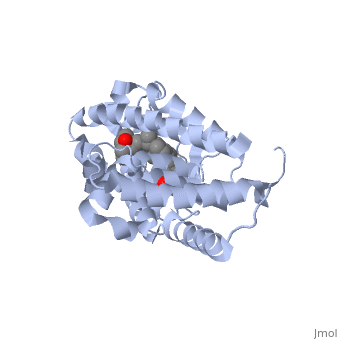1ie8
From Proteopedia
(New page: 200px<br /> <applet load="1ie8" size="450" color="white" frame="true" align="right" spinBox="true" caption="1ie8, resolution 1.52Å" /> '''Crystal Structure O...) |
|||
| Line 1: | Line 1: | ||
| - | [[Image:1ie8.gif|left|200px]]<br /> | + | [[Image:1ie8.gif|left|200px]]<br /><applet load="1ie8" size="350" color="white" frame="true" align="right" spinBox="true" |
| - | <applet load="1ie8" size=" | + | |
caption="1ie8, resolution 1.52Å" /> | caption="1ie8, resolution 1.52Å" /> | ||
'''Crystal Structure Of The Nuclear Receptor For Vitamin D Ligand Binding Domain Bound to KH1060'''<br /> | '''Crystal Structure Of The Nuclear Receptor For Vitamin D Ligand Binding Domain Bound to KH1060'''<br /> | ||
==Overview== | ==Overview== | ||
| - | The crystal structures of the ligand-binding domain (LBD) of the vitamin D | + | The crystal structures of the ligand-binding domain (LBD) of the vitamin D receptor complexed to 1alpha,25(OH)(2)D(3) and the 20-epi analogs, MC1288 and KH1060, show that the protein conformation is identical, conferring a general character to the observation first made for retinoic acid receptor (RAR) that, for a given LBD, the agonist conformation is unique, the ligands adapting to the binding pocket. In all complexes, the A- to D-ring moieties of the ligands adopt the same conformation and form identical contacts with the protein. Differences are observed only for the 17beta-aliphatic chains that adapt their conformation to anchor the 25-hydroxyl group to His-305 and His-397. The inverted geometry of the C20 methyl group induces different paths of the aliphatic chains. The ligands exhibit a low-energy conformation for MC1288 and a more strained conformation for the two others. KH1060 compensates this energy cost by additional contacts. Based on the present data, the explanation of the superagonist effect is to be found in higher stability and longer half-life of the active complex, thereby excluding different conformations of the ligand binding domain. |
==Disease== | ==Disease== | ||
| Line 11: | Line 10: | ||
==About this Structure== | ==About this Structure== | ||
| - | 1IE8 is a [http://en.wikipedia.org/wiki/Single_protein Single protein] structure of sequence from [http://en.wikipedia.org/wiki/Homo_sapiens Homo sapiens] with KH1 as [http://en.wikipedia.org/wiki/ligand ligand]. Full crystallographic information is available from [http:// | + | 1IE8 is a [http://en.wikipedia.org/wiki/Single_protein Single protein] structure of sequence from [http://en.wikipedia.org/wiki/Homo_sapiens Homo sapiens] with <scene name='pdbligand=KH1:'>KH1</scene> as [http://en.wikipedia.org/wiki/ligand ligand]. Full crystallographic information is available from [http://oca.weizmann.ac.il/oca-bin/ocashort?id=1IE8 OCA]. |
==Reference== | ==Reference== | ||
| Line 21: | Line 20: | ||
[[Category: Rochel, N.]] | [[Category: Rochel, N.]] | ||
[[Category: Tocchini-Valentini, G.]] | [[Category: Tocchini-Valentini, G.]] | ||
| - | [[Category: Wurtz, J | + | [[Category: Wurtz, J M.]] |
[[Category: KH1]] | [[Category: KH1]] | ||
[[Category: kh1060]] | [[Category: kh1060]] | ||
[[Category: vdr]] | [[Category: vdr]] | ||
| - | ''Page seeded by [http:// | + | ''Page seeded by [http://oca.weizmann.ac.il/oca OCA ] on Thu Feb 21 13:10:56 2008'' |
Revision as of 11:10, 21 February 2008
|
Crystal Structure Of The Nuclear Receptor For Vitamin D Ligand Binding Domain Bound to KH1060
Contents |
Overview
The crystal structures of the ligand-binding domain (LBD) of the vitamin D receptor complexed to 1alpha,25(OH)(2)D(3) and the 20-epi analogs, MC1288 and KH1060, show that the protein conformation is identical, conferring a general character to the observation first made for retinoic acid receptor (RAR) that, for a given LBD, the agonist conformation is unique, the ligands adapting to the binding pocket. In all complexes, the A- to D-ring moieties of the ligands adopt the same conformation and form identical contacts with the protein. Differences are observed only for the 17beta-aliphatic chains that adapt their conformation to anchor the 25-hydroxyl group to His-305 and His-397. The inverted geometry of the C20 methyl group induces different paths of the aliphatic chains. The ligands exhibit a low-energy conformation for MC1288 and a more strained conformation for the two others. KH1060 compensates this energy cost by additional contacts. Based on the present data, the explanation of the superagonist effect is to be found in higher stability and longer half-life of the active complex, thereby excluding different conformations of the ligand binding domain.
Disease
Known diseases associated with this structure: Osteoporosis, involutional, 166710 (1) OMIM:[601769], Rickets, vitamin D-resistant, type IIA OMIM:[601769]
About this Structure
1IE8 is a Single protein structure of sequence from Homo sapiens with as ligand. Full crystallographic information is available from OCA.
Reference
Crystal structures of the vitamin D receptor complexed to superagonist 20-epi ligands., Tocchini-Valentini G, Rochel N, Wurtz JM, Mitschler A, Moras D, Proc Natl Acad Sci U S A. 2001 May 8;98(10):5491-6. PMID:11344298
Page seeded by OCA on Thu Feb 21 13:10:56 2008
Categories: Homo sapiens | Single protein | Mitschler, A. | Moras, D. | Rochel, N. | Tocchini-Valentini, G. | Wurtz, J M. | KH1 | Kh1060 | Vdr

